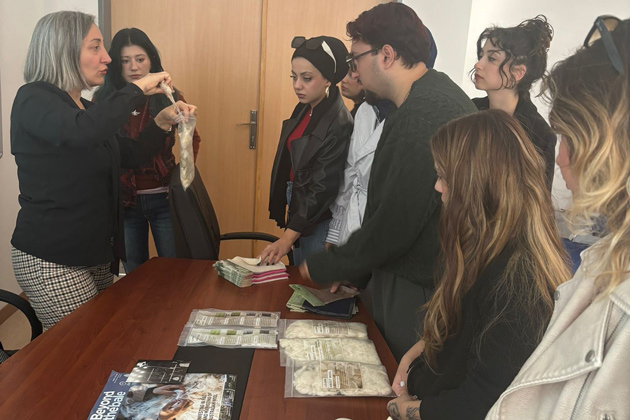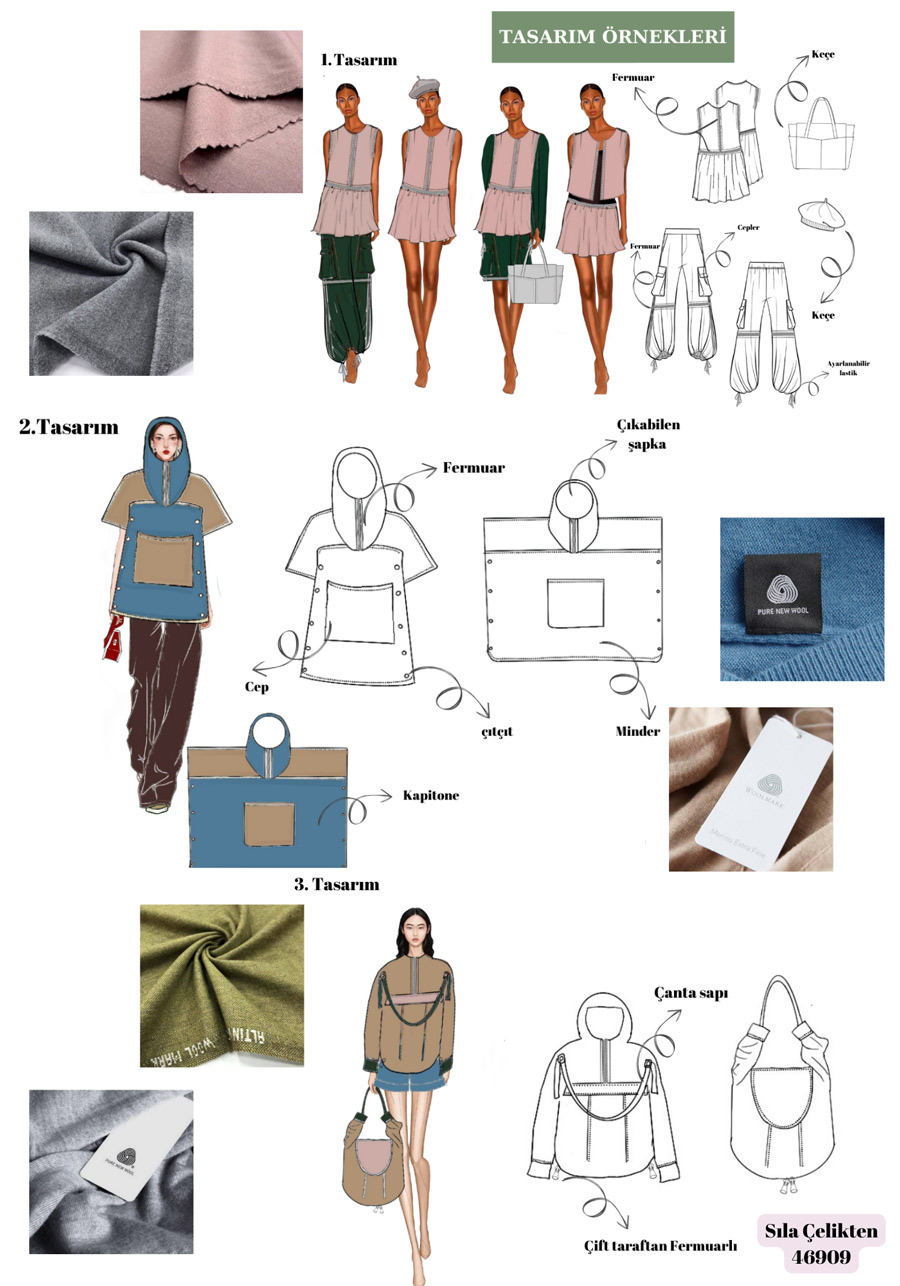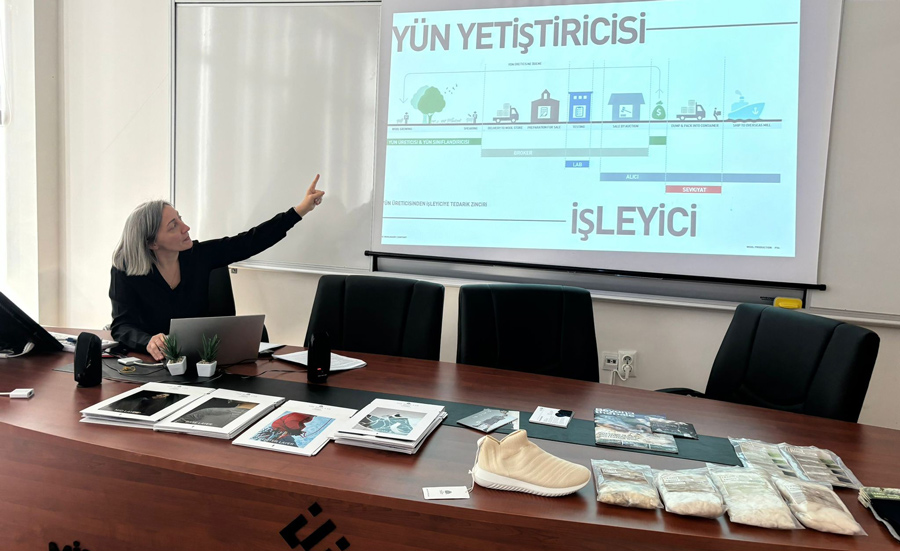Wool education inspires sustainable fashion students

Thanks to an imaginative, educational, initiative run by Woolmark, fashion students in Turkey have learnt about the benefits of Australian wool and explored the role the fibre can have in sustainable fashion systems.
As part of the Sustainable Fashion course at Eskişehir Technical University (ESTU) in Turkey, students undertook a bold and imaginative project to design modular garments made from wool that are suitable for a slow-fashion circular model of production and consumption. A modular garment incorporates detachable or adaptable elements that can be reconfigured into different styles of garment.
The students were tasked to create their designs in response to a hypothetical scenario set in 2050 in which governments had restricted textile production under a Material Preservation Act because of the detrimental effects of fast fashion, and wool had become the primary material for all clothing due to it being a natural, renewable, biodegradable and recyclable fibre.
 An example of the students’ designs, showing how modular wool garments can be reconfigured into different styles and products, thereby enabling consumers to create more sustainable and transitional wardrobes.
An example of the students’ designs, showing how modular wool garments can be reconfigured into different styles and products, thereby enabling consumers to create more sustainable and transitional wardrobes.
Although this hypothetical scenario was created by Woolmark for ESTU, it has been included in the Fashion Fictions project – an international, open-access initiative founded by Professor Amy Twigger Holroyd of Nottingham Trent University in the UK – and it can be accessed and used by anyone across the world. Launched in 2020, the Fashion Fictions project has been used by thousands of participants to design garments for fictional yet plausible future fashion systems to address real-world sustainability challenges.
Education about wool
The initiative strengthened Woolmark’s engagement with university-level students – the next generation of designers and decision-makers in the fashion and textile industry.
“By introducing students early in their academic journey to the provenance, performance, and sustainability benefits of Merino wool, Woolmark is inspiring greater awareness and uptake of wool in their future creative and professional practices,” said Gülay Gökbayrak of Woolmark Turkey.
“The initiative also addressed the current lack of in-depth wool education within tertiary design curricula, and highlights wool’s role in circularity and its relevance in sustainable fashion systems.”
To equip the ESTU students with knowledge about wool to complete their project, they were provided with a series of seminars presented by Woolmark and other industry experts.
Led by Gülay Gökbayrak, the students were first introduced to wool via the online Woolmark Learning Centre education platform, which was followed by a face-to-face seminar at ESTU in which Gülay presented a Circular by Nature session which highlighted wool’s technical properties, environmental benefits, and circular design potential.
 Gülay Gökbayrak of Woolmark Turkey teaching the students about the supply chain of Australian wool.
Gülay Gökbayrak of Woolmark Turkey teaching the students about the supply chain of Australian wool.
The students also attended seminars by Woolmark Sustainability Manager Europe, Elisabeth van Delden, who outlined the limitations of lifecycle assessments and called for more holistic tools to capture the full environmental performance of wool; sustainability expert Mehmet Baba from Fuerte Consultancy who examined certifications in the textile industry; and assistant designer at Turkish slow fashion brand GIYI, Hilal Arslan, who talked about sustainable fashion design practices.
Positive feedback
Feedback from the students and ESTU faculty was that the project and seminars were enjoyable, useful and significantly increased their understanding of wool’s properties and benefits.
“This design-driven experience has left a lasting impression on the students. It’s been truly rewarding to see how wool – as both a material and a mindset – can inspire young designers to imagine a more sustainable future,” said Gülay. “The designs created by the students, while rooted in real-world design thinking, reflect the mindset of a new generation of designers who embrace complexity, sustainability, and vision.”
Assistant Professor Sanem Odabasi of the ESTU Textile and Fashion Design Department says the educational project and seminars were highly informative and engaging.
“They provided valuable insights into sustainable fashion practices and the importance of wool in circular design. Including practical examples and industry perspectives made the content relevant and impactful,” she said. “Wool’s natural properties make it highly durable and suitable for sustainable fashion applications. After this experience, I am more likely to choose wool products in the future.”
More information:
www.fashionfictions.org/2025/01/15/world-263
www.woolmarklearningcentre.com
This article appeared in the Winter 2025 edition of AWI’s Beyond the Bale magazine that was published in June 2025. Reproduction of the article is encouraged.












